| Srl | Item |
| 1 |
ID:
113178
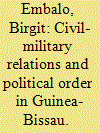

|
|
|
|
|
| Publication |
2012.
|
| Summary/Abstract |
Since independence in 1974 the military of Guinea-Bissau have succeeded in controlling the political system, even attempting to impose their rule directly in the aftermath of the 1998/9 war. What makes the analysis of civil-military relations and political order in contemporary Guinea-Bissau particularly challenging is the overlapping of political, ethnic and personal considerations of the politico-military elite and their fluctuating and ambiguous short-term alliances. Guinea-Bissau's armed forces include an amalgam of veterans, claiming historical legitimacy from the liberation war, and officers who use their positions for personal gain rather than furthering democracy and national interests. This article examines the logic of civil-military relations against the heterarchical political figuration and the specific character of the politico-military elite of Guinea-Bissau.
|
|
|
|
|
|
|
|
|
|
|
|
|
|
|
|
| 2 |
ID:
117648
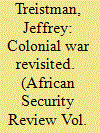

|
|
|
|
|
| Publication |
2012.
|
| Summary/Abstract |
The Carnation Revolution on 25 April 1974 toppled the authoritarian regime in Lisbon. It is fallacious to conclude, however, that the 1974 coup d'état signaled Portugal's defeat in the Colonial War. The status of each conflict on the eve of the Carnation Revolution varied, and it was by no means inevitable that Portugal would have been defeated in all three theatres had the coup not occurred. This brief research note therefore advances a novel approach to examining the Colonial War by assessing the outcomes prior to the 1974 coup. In particular, the author proposes that Portugal achieved military victory in Angola and Mozambique, but was defeated in Guinea-Bissau.
|
|
|
|
|
|
|
|
|
|
|
|
|
|
|
|
| 3 |
ID:
115228
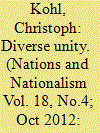

|
|
|
|
|
| Publication |
2012.
|
| Summary/Abstract |
The paper explores how creole categories of people who have constituted a small but influential minority in Guinea-Bissau for centuries contributed to a countrywide, integrated national culture since the eve of independence in 1974. Since independence, several cultural representations previously exclusive to creole communities have been - driven by the nationalist independence movement and the early postcolonial state - transformed into representations of a new national culture, crossing ethnic and religious boundaries. The fact that creole identity and culture had been transethnic - i.e. creole identity brings together individuals of heterogeneous cultural, ethnic and geographic descent - during the colonial period, has fostered in postcolonial times the countrywide spread of previously exclusively creole cultural features. I argue that this 'transethnicisation' of creole cultural representations has unified Bissau-Guineans across ethnic lines, causing a strong commitment with their nation 'from below'.
|
|
|
|
|
|
|
|
|
|
|
|
|
|
|
|
| 4 |
ID:
116343
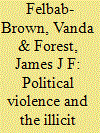

|
|
|
|
|
| Publication |
2012.
|
| Summary/Abstract |
This comparative analysis draws on field research in several West African countries to illustrate the dynamic relationships between political violence and organized crime in this sub-region. These relationships are often transactional, and almost always on a temporary basis. While some alliances of convenience may be forged, in other cases an adversarial relationship exists between organized crime and terrorist networks. In some cases, key actors within West African governments have benefited from these relationships. We then examine recent policies and strategies pursued by the U.S. and the international community that, in the name of combating terrorism, seek to constrain the illicit economies of the region, but in doing so may do more harm than good. The article concludes with some policy recommendations based on this analysis.
|
|
|
|
|
|
|
|
|
|
|
|
|
|
|
|
| 5 |
ID:
086084
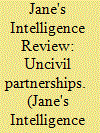

|
|
|